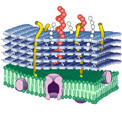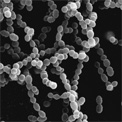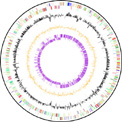Research activities in this area are focused on a specific group of Gram-positive bacteria, generically referred to as "lactic acid bacteria" (LAB), which are of major industrial importance in food fermentation. Moreover, some LAB species are natural members of the intestinal microflora of mammals where they play a beneficial health role.
Three model species are currently studied at the genetic and physiological levels:
- Lactobacillus plantarum
- Lactococcus lactis
- Streptococcus thermophilus
A multidisciplinary range of genomics/post-genomics, biochemical, and biophysical approaches are used to study the function of genes that are involved in:
In order to improve our knowledge of LAB metabolism, we established the complete genome sequence of Streptococcus thermophilus, a yoghurt starter and an unique example of a non-pathogenic Streptococcus.
DNA microarrays are currently exploited for transcriptomic analyses in order to study regulatory networks (carbon catabolite repression, quorum-sensing mechanisms for bacteriocin production and competence)
Metabolic engineering and heterologous expression technologies are also used to engineer LAB strains to serve as starters in dairy fermentation, or as host systems for the production and the delivery of specific compounds of food and pharmaceutical interest.


